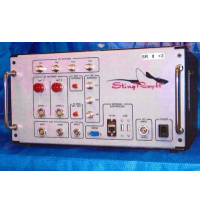Baltimore Prosecutors Withdraw Evidence of Cellphone Tracking because of FBI Non-Disclosure Agreement
 Harris Corporation’s StingRay (photo: U.S. Patent and Trademark Office)
Harris Corporation’s StingRay (photo: U.S. Patent and Trademark Office)
The federal government’s blanket secrecy on cell-phone tracking technology provided to local police may wind up jeopardizing criminal cases aided by the equipment.
In Baltimore, police were suspected by a defense attorney of using the StingRay system, which mimics a cellphone tower and can capture information about cell phone calls and users, to collect data about their client.
So the lawyer pressed Detective John L. Haley in court about how the department obtained certain evidence against the accused. Circuit Judge Barry G. Williams sided with the defense and compelled the officer to answer the question, threatening him with contempt of court. But before that could happen, the prosecution withdrew evidence, including a handgun and cellphone, from the case so they wouldn’t get in trouble with the Federal Bureau of Investigation (FBI).
An attorney for the American Civil Liberties Union agreed with the judge’s decision. “You can’t contract out of constitutional disclosure obligations,” Nathan Freed Wessler, who has been tracking these kinds of cases, told The Baltimore Sun. “A secret written agreement does not invalidate the Maryland public records law [and] does not invalidate due process requirements of giving information to a criminal defendant.”
The FBI has provided StingRay to law enforcement agencies around the country as long as they agree not to discuss it with anyone.
“Law enforcement officials in Maryland and across the country say they are prohibited from discussing the technology at the direction of the federal government, which has argued that knowledge of the devices would jeopardize investigations,” the Sun’s Justin Fenton wrote.
A similar case came before Williams in September. Again, a suspect was traced by means that the prosecution would not disclose and the state was forced to drop the evidence gained via that search.
-Noel Brinkerhoff
To Learn More:
Judge Threatens Detective with Contempt for Declining to Reveal Cellphone Tracking Methods (by Justin Fenton, Baltimore Sun)
As FBI Spying Program Goes on Trial, Twitter Sues U.S. Government over Surveillance Data Disclosure (by Noel Brinkerhoff and Steve Straehley, AllGov)
Local Police Departments Use Non-Disclosure Agreements to Hide Cellphone Tracking (by Noel Brinkerhoff, AllGov)
- Top Stories
- Unusual News
- Where is the Money Going?
- Controversies
- U.S. and the World
- Appointments and Resignations
- Latest News
- Trump to Stop Deportations If…
- Trump Denounces World Series
- What If China Invaded the United States?
- Donald Trump Has a Mental Health Problem and It Has a Name
- Trump Goes on Renaming Frenzy






Comments